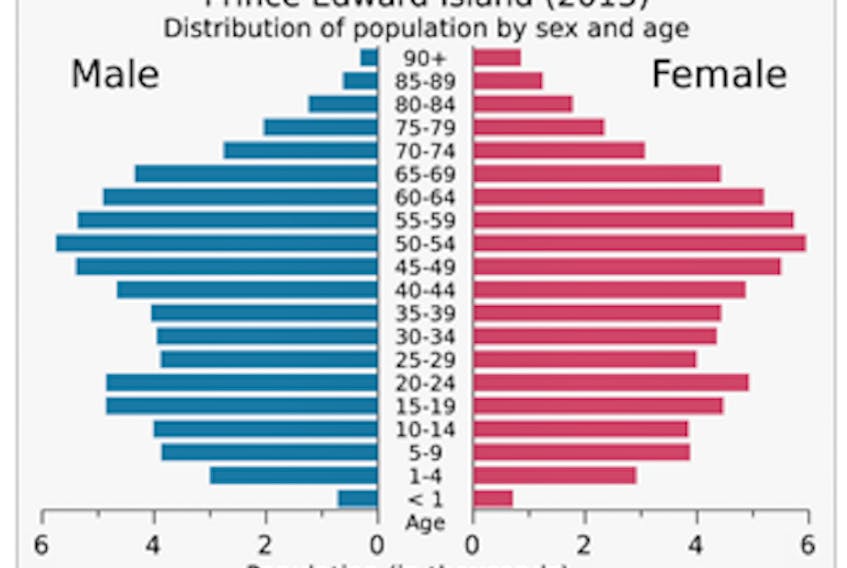BY ROBERT LETHBRIDGE
GUEST OPINION
Ideally a population pyramid would have a bulge in its younger population groups, or at least enough to maintain population growth or stability. This is the dilemma on P.E.I. -- how to grow the population enough to provide replacement workers for a retiring population and the tax base to support them?
In a 2003 report published in 2006, “Coming to, and Settling on, P.E.I.: Stories and Voices, written by G. Baldacchino, Canada Research chair (Island Studies) UPEI, the report surveyed 320 of the 4,500 immigrants to P.E.I. from 1998 to 2003.
From the report: A longitudinal study of immigrants undertaken by Statistics Canada confirms the ‘MTV Syndrome’: that 74 per cent of recent immigrants have settled in just three cities: Toronto (46 per cent), Vancouver (15 per cent) and Montreal (13 per cent). Only 6 per cent of immigrants to Canada settle in rural regions. According to the report, close to 225,000 immigrants are accepted into the country every year. The 2001 census data reports “4,140 residents of P.E.I. reported as immigrants.” Of the 320 surveyed: 36 respondents (11.25 per cent) indicated that they were “actively planning on leaving P.E.I.”
“It may come as a surprise that, while a variety of economic reasons are the most numerous inducers towards likely out-migration, it is the alleged close-mindedness of Islanders that is identified as the most common explanation for the desire to relocate. This issue apart, the main inducer to leave P.E.I. is finance-related. Low wages, high taxes, bridge tolls, and absence of all-round employment are readily quoted.
Conclusion: The Islander versus ‘come from away’ category is an important contemporary social divide on P.E.I. (just like the red-blue partisan one) and contributes to a reservoir of mutual misunderstanding.
A Jan. 22, 2015 item on CBC: Katie Mazer, a University of Toronto researcher who examines migration from the Maritimes to Canada's resource sectors out west, said the number of workers leaving is much higher in P.E.I. than other provinces. Over the past decade, P.E.I. has lost more than 6,500 people aged under 45 to interprovincial migration. During that same period, it has gained more 1,400 people who have passed their 45th birthday. As a result, the proportion of people aged 45 and older on the Island increased from 41.4 per cent in 2005 to 47.7 per cent in 2014.
The early version immigrant investor program of the provincial nominee program, which ended in 2008, drew accusations of corruption for the way it was administered, but it also provided a huge boost to immigration. Just a few hundred immigrants a year were coming to the Island in the early years of the century, but it peaked at 2,609 in 2010-11. More than three quarters of those immigrants were younger than 45. Immigration has slowed the rate of aging of the P.E.I. population over the last five years, but it is still likely that 50 per cent of the population will be older than 45 by 2019. (CBC 16 Aug 2016)
That’s the dilemma for the provincial government: How to encourage newcomers and retain both newcomers and Islanders? The PNP program has brought a more affluent group of migrants to the Island, who want to avoid the “Hongcouver” syndrome, but in the process, have inadvertently increased housing costs generally.
There is another less financially fortunate visible migrant group that lacks the resources of the PNP candidates. This group has added to the stresses of the education and health care systems, but is younger and arguably most attractive.
The most common complaint among persons moving to, or, staying here is the lack of well-paid employment. As NDP P.E.I. believes a $15 minimum wage would be a move in that direction. Raising the income tax threshold in sequence with a minimum wage would another step toward improving the discretionary income of Island residents. Leaving the tax threshold, the lowest in Canada, only helps to improve the provincial government’s revenues when there is a minimum wage increase.
- Robert Lethbridge of Cardigan is a member of the NDP P.E.I.









